All About Air Conditioning System:
The Summer time is on and now it's the time when everyone will thinking about buying an AC. I am a professional Electrical Engineer so, I have been asked by many of my friends and relatives to suggest them the best suitable AC. So, I though of making a blog post in detail to discuss about every little thing that everyone should know before buying an AC.
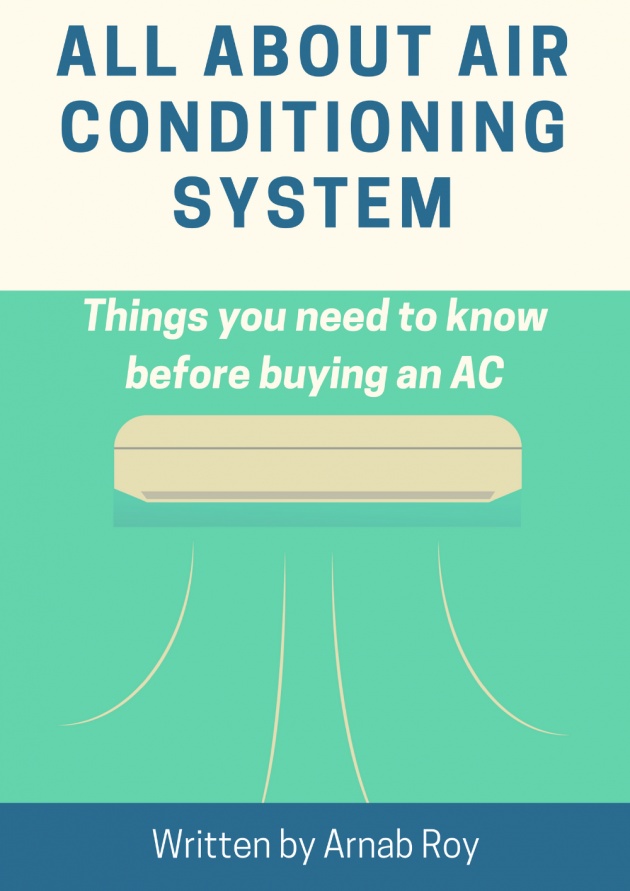
Image Credits: Canva
Working Principle of AC:
At first let's understand how Air Conditioning system works.
An Air Condition system collects hot air from a given space then it's goes through compression and evaporation resulting in releasing cool air to the same space from where the hot air is being collected.
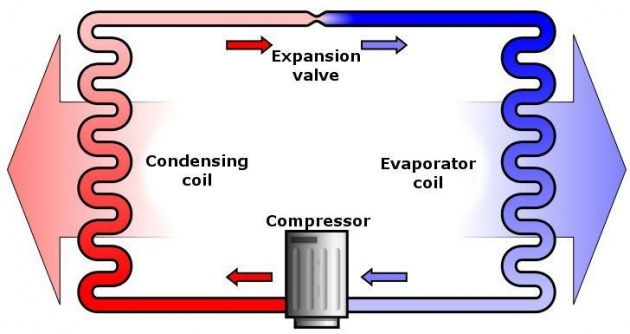
Image Credits: Wikipedia
Parts of Air Conditioning System:
- Compressor
- Condenser Coils
- Expansion Valve
- Refrigerant Gas
- Evaporator Coil
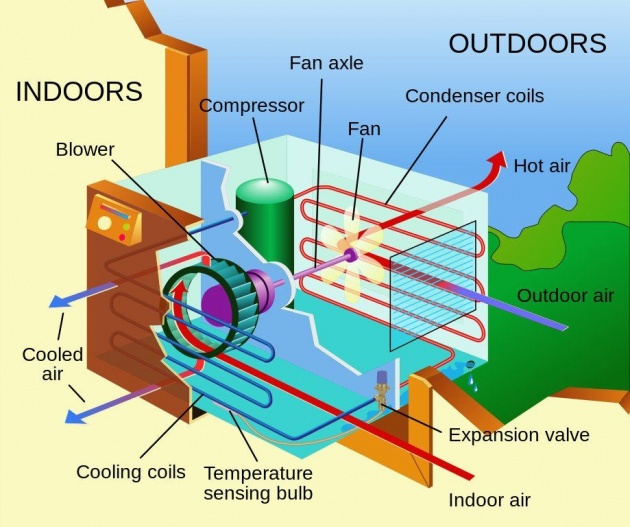
Image Credits: Wikipedia
At first the refrigerant gas(HFC: Hydro Fluro Carbon) goes to the compressor. After the compression temperature and pressure of the refrigerant gas becomes high. Then the high pressure and high temp gas goes to condenser coil where the heat is being extracted from the refrigerant and the refrigerant gas converted into liquid refrigerant. Then the low temperature high pressure liquid refrigerant goes through Expansion Valve where the high pressure liquid refrigerant is being expanded and the pressure released. Then the low pressure low temperature liquid refrigerant goes through Evaporator. As the liquid refrigerant pressure was released so it lower the temp of Evaporator coils. Now when our room temp hot air comes in touch with evaporator room temp becomes cold the liquid refrigerant collects all the heat from our room and again it goes to gaseous state. Then again the refrigerant gas goes to the compressor and the cycle continue.
If you still did't understand about how Air Conditioning System works please refer to the video below:
Video Credit: Intelligent Design Air Conditioning and Heating
Classification of Air Conditioning System:
Let's start by classifying different types of Air Conditioning Systems. It is the basis part of Air Conditioning system. Different types of Air Conditioning system is being used for our Home, School, Office and Industries. Mainly there are 4 common types of Air conditioning systems available depending upon their use in domestic or industrial environment.
1. Window Air Conditioner: Window AC is designed to cool a single room. As all the units of this AC is fixed in the window it is known as Window AC. This type of AC is suitable for domestic small size rooms. Low budget but cooling effect will be less than split AC.
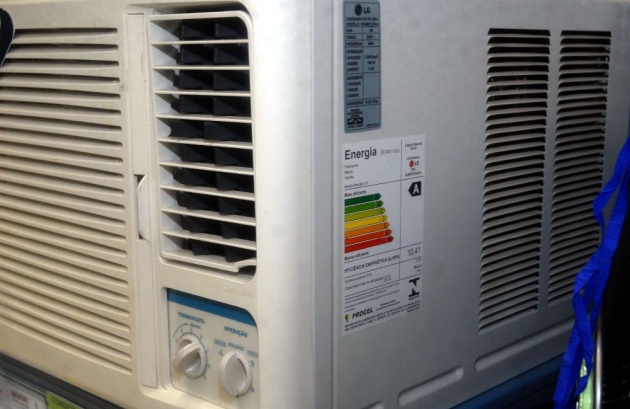
Image Credits: Wikipedia
2. Split Air Conditioner: As the Name suggests this type of AC is split into 2 parts. The parts of this type of AC's are divided into 2 parts: Indoor & Outdoor. The Indoor unit is fixed inside room and it's consist of evaporator coil and cooling fan. The outdoor unit is fixed outside room and it's consist of compressor, condenser and expansion valve. This type of AC is better than window AC and suitable for single or double rooms with good cooling effect.
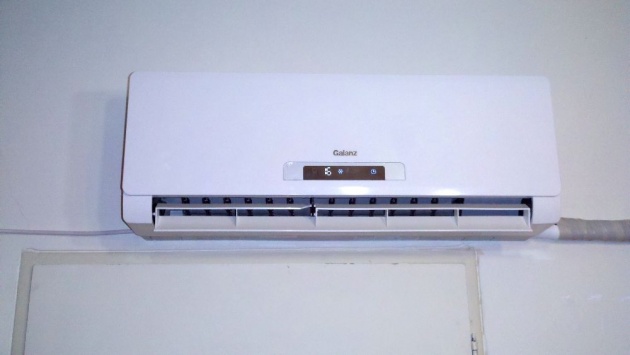
Image Credits: Wikipedia
3. Packaged Air Conditioner: Packaged unit AC is used for cooling multiple rooms or a large space like office, hotels, restaurants, hospitals etc. This type of AC's are mainly used for industrial space and not used in domestic system. This type of AC requires 3 Phase Voltage and consist of multiple Compressors unlike window or split unit which generally consist of only one compressor.
4. Central Air Conditioning System: This unit is used primarily to cool big buildings, offices, malls, hotels, factories etc. The central air conditioning system is comprised of a huge compressor that has the capacity to produce hundreds of tons of air conditioning. If you have a big area to cool, central air conditioning is the right choice for you.
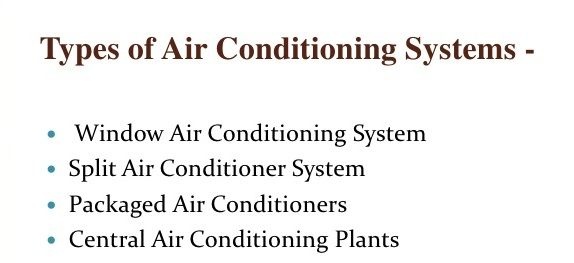
Image Credits: Arnab
I am here to discuss AC's which are generally used in our homes so, I will not discuss about industrial type Air Conditioning systems like Packaged Unit and Central AC Unit. There are also many other type of Air Conditioning systems available like Chilled Water Cooling Plant, Ductable split AC unit etc but those are not very common and also used for large industrial only, so I did not describe them in detail.
Now let's discuss about things you need to know before buying an AC.
What is Ton in AC?
This is the most commonly asked question of all that what is Ton in AC system as all type of AC power is calculated in Ton instead of Wattage like every other system in our home. From the definition 1 Ton AC will give you cooling effect of 1 Ton Ice. That means if you can able to put 1 Ton(1 Ton=107 Kilogram) Ice in your room you will get cooling effect of 1 Ton power of AC. in general 1 Ton AC takes power of 3516 watt approx. This calculation will be different depending upon your AC's star rating.
What is Inverter AC and Non-Inverter AC?
The biggest and most important difference between Inverter AC and Non-Inverter AC is that Non-Inverter AC motor runs at fixed speed where as Inverter AC motor runs at variable speed which means the speed can be high and low depending upon room temperature.
In Non-Inverter AC suppose we set the temperature at 24 degrees so, after reaching the desired temp of 24 degree temperature the AC motor will stop. After few minutes when the temp will fall and goes above our set temperature the AC motor will start again.
In Inverter AC the AC motor runs in variable speed, means the speed will be high when the temp is high and speed will be low after reaching the desired set point.
Just have look at the advantages of Inverter type AC's over Non-Inverter type AC's.
- Eco Friendly.
- Energy Efficient.
- Faster Cooling.
- Longer Life.
- Less Noisy Sound.
So, my strong recommendation will be to buy and use Inverter type AC. Don't forget to check your AC type before buying an AC.
What is Star Ratings?
Well depending upon the efficiency of AC's they are given star ratings. Low efficiency AC will get lower ratings means it will consume more power to cool your room. Higher efficiency AC will get higher ratings means it will consume less power in order to cool your room.
So, if I say in general higher rating AC will consume lower wattage and lower rating AC will consume high wattage. The formula of getting your AC's wattage is = (Ton*3516)/Star Rating Co-efficient
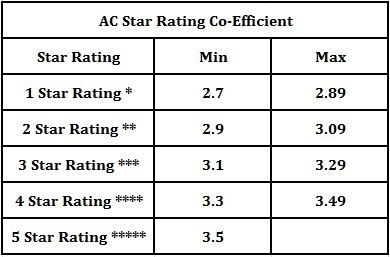
Image Credits: Arnab
Example: Let's say you have a 2 Ton AC with 4 star rating. Then the power (Wattage) consumed by your AC will be: (2*3516)/3.3 = 2130 Watt.
Selecting AC For Your Room:
Selecting AC is very important depending upon your need, your outside weather type, room type. I am just trying to give all of you a general idea about how to select a AC depending upon your room size.
At first you need to find out your rooms volume. To calculate your room's volume you need to multiply your room's length, width and height. Take all units in ft.
Room Volume = (Length * Width * Height) (All Units will be in ft)
Now Ton required to cool your room will be = (Cube root of Volume/10)
Example: Let's assume you have room length of 15 ft, Width of 14 ft and height of 10 ft.
Volume of your room will be = 15*14*10 = 2100
Ton required for your room = (Cube root of 2100/10) = 12.8/10 = 1.28 Ton
So, as per calculation you need a AC with Ton more than 1.28 to cool your room. So, you need to buy a 1.5 Ton AC for your room.
This is just a general idea of selecting a AC based upon your room size. This may vary depending upon your local weather, which floor the room is, no of windows in room, if the room is sunlight facing or not etc.
Hope all the information I gave here will help you buying an AC. Still if you have any doubt please don't hesitate to ask me here in comments. I will be happy to help you.
Written for Bitlanders
by Arnab Roy
To connect with me on Facebook
Visit my personal blog Softfreakz



